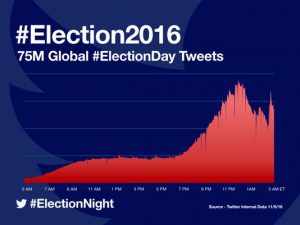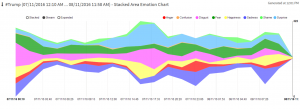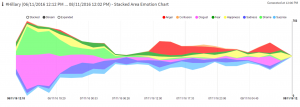
Some of you may still be in shock after what has happened in the US this week. But regardless of the outcome of the election, the online reactions leading up to Trump’s victory spelled a massive win for Twitter.

Picture Credit | Twitter
It appears that the event provoked so many people to voice their opinions online that Twitter almost spontaneously combusted with a massive 75 million election-related tweets leading up to the final announcement.
Given that overall Internet traffic actually dropped by 15% due to people watching the news on TV instead, this is a relatively surprising result for the social media giant.
Donald ducks into White House
The cause is most likely the passion people naturally felt at the facts surrounding the presidential race, with a divided populace continually failing to understand the logic of their foes on the opposite side.
In fact, the divisiveness of four years ago was majorly surpassed as the election in 2012 generated a mere 31 million election-related tweets in comparison.
Many were still rubbing their eyes as they failed to believe what few thought possible and as Hillary Clinton appeared for her concession speech many of her supporters were brought to tears.
Look into my tweets
But there are some who claim to have predicted the election results before it happened. Most interestingly, researchers at Loughborough University used their ‘Emotive’ tool to measure the popularity of both candidates based on the emotions associated with tweets that mentioned either nominee.

Trump’s emotions | Picture Credit | EMOTIVE
By tracking Twitter in the lead up to the vote, they found that Trump was always ahead of Clinton, as mentions of him involved more use of emotion, which indicated that he was going to win.

Clinton’s emotions | Picture Credit | EMOTIVE |
This is obviously a different technique to traditional polling and may provide a more modern insight into the way people think about current issues and how they are called to action.
However you look at it, using social media analysis to observe trends in public opinion clearly has a role to play in the future and some are even calling for the platforms to behave more like news organisations, to spread only factual information.
This seems to miss the point a bit for me, but tracking emotions online is definitely a great way of understanding opinion trends. Maybe we should give it another go in four years time.